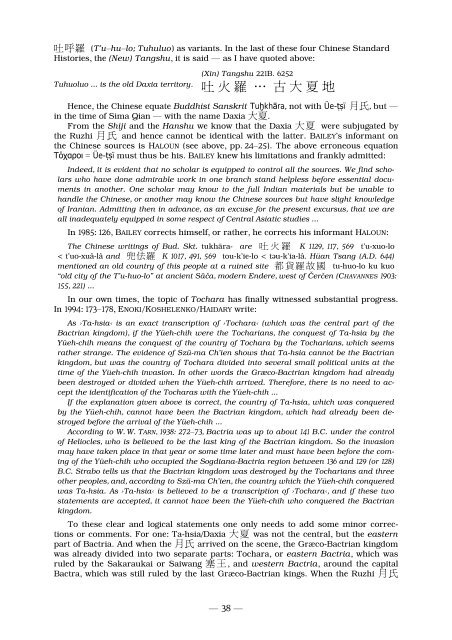張騫 Zhang Qian. The Secret Envoy of Han Emperor Wu in Search of the Arsi (Yuezhi) and the Fall of the Græco-Bactrian Kingdom. (Annotated Compilation of Eastern and Western Sources)
The study undertakes: — to clarify in what year Zhang Qian reached the Oxus river; to establish that the Daxia 大夏 in Shiji 123 represent the Tachar/Tochar of Tochar-i-stan; to explain how we are to understand the "List of Four" in Strabon 11.8.2.
The study undertakes: —
to clarify in what year Zhang Qian reached the Oxus river;
to establish that the Daxia 大夏 in Shiji 123 represent the Tachar/Tochar of Tochar-i-stan;
to explain how we are to understand the "List of Four" in Strabon 11.8.2.
Create successful ePaper yourself
Turn your PDF publications into a flip-book with our unique Google optimized e-Paper software.
吐 呼 羅 (T’u–hu–lo; Tuhuluo) as variants. In <strong>the</strong> last <strong>of</strong> <strong>the</strong>se four Ch<strong>in</strong>ese St<strong>and</strong>ard<br />
Histories, <strong>the</strong> (New) Tangshu, it is said — as I have quoted above:<br />
Tuhuoluo ... is <strong>the</strong> old Daxia territory.<br />
(X<strong>in</strong>) Tangshu 221B. 6252<br />
吐 火 羅 … 古 大 夏 地<br />
Hence, <strong>the</strong> Ch<strong>in</strong>ese equate Buddhist Sanskrit Tuḫkhāra, not with Üe-ṭṣï 月 氏 , but —<br />
<strong>in</strong> <strong>the</strong> time <strong>of</strong> Sima <strong>Qian</strong> — with <strong>the</strong> name Daxia 大 夏 .<br />
From <strong>the</strong> Shiji <strong>and</strong> <strong>the</strong> <strong>Han</strong>shu we know that <strong>the</strong> Daxia 大 夏 were subjugated by<br />
<strong>the</strong> Ruzhi 月 氏 <strong>and</strong> hence cannot be identical with <strong>the</strong> latter. BAILEY’s <strong>in</strong>formant on<br />
<strong>the</strong> Ch<strong>in</strong>ese sources is HALOUN (see above, pp. 24–25). <strong>The</strong> above erroneous equation<br />
Τόχαροι = Üe-ṭṣï must thus be his. BAILEY knew his limitations <strong>and</strong> frankly admitted:<br />
Indeed, it is evident that no scholar is equipped to control all <strong>the</strong> sources. We f<strong>in</strong>d scholars<br />
who have done admirable work <strong>in</strong> one branch st<strong>and</strong> helpless before essential documents<br />
<strong>in</strong> ano<strong>the</strong>r. One scholar may know to <strong>the</strong> full Indian materials but be unable to<br />
h<strong>and</strong>le <strong>the</strong> Ch<strong>in</strong>ese, or ano<strong>the</strong>r may know <strong>the</strong> Ch<strong>in</strong>ese sources but have slight knowledge<br />
<strong>of</strong> Iranian. Admitt<strong>in</strong>g <strong>the</strong>n <strong>in</strong> advance, as an excuse for <strong>the</strong> present excursus, that we are<br />
all <strong>in</strong>adequately equipped <strong>in</strong> some respect <strong>of</strong> Central Asiatic studies ...<br />
In 1985: 126, BAILEY corrects himself, or ra<strong>the</strong>r, he corrects his <strong>in</strong>formant HALOUN:<br />
<strong>The</strong> Ch<strong>in</strong>ese writ<strong>in</strong>gs <strong>of</strong> Bud. Skt. tukhåra- are 吐 火 羅 K 1129, 117, 569 t’u-xuo-lo<br />
< t’uo-xuâ-lâ <strong>and</strong> 兜 佉 羅 K 1017, 491, 569 tou-k’ie-lo < tÿu-k’ia-lâ. Hüan Tsang (A.D. 644)<br />
mentioned an old country <strong>of</strong> this people at a ru<strong>in</strong>ed site 都 貨 羅 故 國 tu-huo-lo ku kuo<br />
“old city <strong>of</strong> <strong>the</strong> T’u-huo-lo” at ancient Så¾a, modern Endere, west <strong>of</strong> ²er¾en (CHAVANNES 1903:<br />
155, 221) ...<br />
In our own times, <strong>the</strong> topic <strong>of</strong> Tochara has f<strong>in</strong>ally witnessed substantial progress.<br />
In 1994: 173–178, ENOKI / KOSHELENKO / HAIDARY write:<br />
As ›Ta-hsia‹ is an exact transcription <strong>of</strong> ›Tochara‹ (which was <strong>the</strong> central part <strong>of</strong> <strong>the</strong><br />
<strong>Bactrian</strong> k<strong>in</strong>gdom), if <strong>the</strong> Yüeh-chih were <strong>the</strong> Tocharians, <strong>the</strong> conquest <strong>of</strong> Ta-hsia by <strong>the</strong><br />
Yüeh-chih means <strong>the</strong> conquest <strong>of</strong> <strong>the</strong> country <strong>of</strong> Tochara by <strong>the</strong> Tocharians, which seems<br />
ra<strong>the</strong>r strange. <strong>The</strong> evidence <strong>of</strong> Sz°-ma Ch’ien shows that Ta-hsia cannot be <strong>the</strong> <strong>Bactrian</strong><br />
k<strong>in</strong>gdom, but was <strong>the</strong> country <strong>of</strong> Tochara divided <strong>in</strong>to several small political units at <strong>the</strong><br />
time <strong>of</strong> <strong>the</strong> Yüeh-chih <strong>in</strong>vasion. In o<strong>the</strong>r words <strong>the</strong> <strong>Græco</strong>-<strong>Bactrian</strong> k<strong>in</strong>gdom had already<br />
been destroyed or divided when <strong>the</strong> Yüeh-chih arrived. <strong>The</strong>refore, <strong>the</strong>re is no need to accept<br />
<strong>the</strong> identification <strong>of</strong> <strong>the</strong> Tocharas with <strong>the</strong> Yüeh-chih ...<br />
If <strong>the</strong> explanation given above is correct, <strong>the</strong> country <strong>of</strong> Ta-hsia, which was conquered<br />
by <strong>the</strong> Yüeh-chih, cannot have been <strong>the</strong> <strong>Bactrian</strong> k<strong>in</strong>gdom, which had already been destroyed<br />
before <strong>the</strong> arrival <strong>of</strong> <strong>the</strong> Yüeh-chih ...<br />
Accord<strong>in</strong>g to W. W. TARN, 1938: 272–73, Bactria<br />
was up to about 141 B.C. under <strong>the</strong> control<br />
<strong>of</strong> Heliocles, who is believed to be <strong>the</strong> last k<strong>in</strong>g <strong>of</strong> <strong>the</strong> Bactr ian k<strong>in</strong>gdom. S o <strong>the</strong> <strong>in</strong>vasion<br />
may have taken place <strong>in</strong> that year or some time later <strong>and</strong> must have been before <strong>the</strong> com<strong>in</strong>g<br />
<strong>of</strong> <strong>the</strong> Yüeh-chih who occupied <strong>the</strong> Sogdiana-Bactria region between 136 <strong>and</strong> 129 (or 128)<br />
B.C. Strabo tells us that <strong>the</strong> <strong>Bactrian</strong> k<strong>in</strong>gdom was destroyed by <strong>the</strong> Tocharians <strong>and</strong> three<br />
o<strong>the</strong>r peoples, <strong>and</strong>, accord<strong>in</strong>g to Sz°-ma Ch’ien, <strong>the</strong> country which <strong>the</strong> Yüeh-chih conquered<br />
was Ta-hsia. As ›Ta-hsia‹ is believed to be a transcription <strong>of</strong> ›Tochara‹, <strong>and</strong> if <strong>the</strong>se two<br />
statements are accepted, it cannot have been <strong>the</strong> Yüeh-chih who conquered <strong>the</strong> <strong>Bactrian</strong><br />
k<strong>in</strong>gdom.<br />
To <strong>the</strong>se clear <strong>and</strong> logical statements one only needs to add some m<strong>in</strong>or corrections<br />
or comments. For one: Ta-hsia/Daxia 大 夏 was not <strong>the</strong> central, but <strong>the</strong> eastern<br />
part <strong>of</strong> Bactria. And when <strong>the</strong> 月 氏 arrived on <strong>the</strong> scene, <strong>the</strong> <strong>Græco</strong>-<strong>Bactrian</strong> k<strong>in</strong>gdom<br />
was already divided <strong>in</strong>to two separate parts: Tochara, or eastern Bactria, which was<br />
ruled by <strong>the</strong> Sakaraukai or Saiwang 塞 王 , <strong>and</strong> western Bactria, around <strong>the</strong> capital<br />
Bactra, which was still ruled by <strong>the</strong> la<br />
st <strong>Græco</strong>-<strong>Bactrian</strong> k<strong>in</strong>gs. When <strong>the</strong> Ruzhi 月 氏<br />
— 38 —


